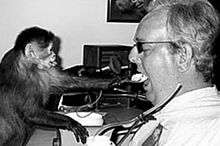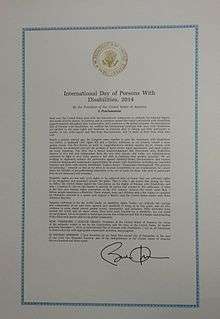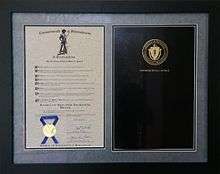National Telecommuting Institute
National Telecommuting Institute, Inc.[1] (NTI) is a 501 (c) (3) non-profit organization focused on placing Americans with Disabilities and Disabled Veterans in jobs since 1995. NTI is headquartered in Downtown Boston with virtual personnel across the United States. As the pioneers in the industry, NTI has initiated the evolution of telecommuting, helping Americans with Disabilities and has set the standards for a work-at-home environment for over 20 years.
Since the inception of NTI, the non-profit has expanded into 3 Divisions:
The Medical Transcription (MT) division was disbanded at the end of 2014.
The NTI@Home division is dedicated to placing Disabled Veterans and Americans with Disabilities in Work at Home positions. The primary roles NTI fulfills include Call Centers, Sales, Customer Service, Tier I and Tier II Help Desk roles for Fortune 500 companies such as IBM, Meijer, Amazon, and Sykes.[5] In addition, NTI has provided third party services to staffing agencies to help with their 508 needs. Not only does NTI supply the people, but the call center technology as well.
History


On June 23, 1995, NTI was started by the 3 founders, Dr. Paul Corcoran, Chairman of the Rehabilitation Department at the Tufts New England Medical Center; Dr. Mark Schlesinger, Chairman of Health Economics Department at Yale; and Dr. M.J. Willard, Behavioral Psychologist who had spent the prior 15 years working with individuals with severe physical disabilities function within their home environment.
Prior to NTI, Dr. Willard had spent three years as a research assistant to famed psychologist B.F. Skinner and concluded that his behavior-modification methods could be used to train monkeys to help the disabled. Dr. Willard then focused her efforts on a non-profit called Helping Hands:[6] Simian Aides for the Disabled which was started in 1977. She spearheaded the concept of using moneys to assist quadriplegics in daily tasks..[7]
In the early 90’s Dr. Willard further explored existing work opportunities for individuals with physical disabilities who wanted to work from their homes. In her quest, Dr. Willard discovered that there was little being done in this field. At the time, work at home positions were scarce and she was able to place individuals only on a one on one basis. The original work at home positions consisted of appointment reminder calls for medical practices and hospitals, data entry, book indexing and medical or legal transcription services. However, Dr. Willard was faced with a dilemma having too many individuals with disabilities to place and not enough work-from-home positions in the workforce.
With research funding from the Department of Education, Dr Willard interviewed experts in the employment field, who recommended she look at the areas of customer service and the call center industry. Industry experts felt these two fields would grow exponentially in terms of virtual environments.
Forty years ago, virtual call center agents did not exist. Today the industry employs over 3 million Americans. Currently, 53% of call centers in the US employ remote call center agents. Experts predict the trend will continue, driven by economic issues. Software and hardware technology has improved to where call center managers have many options that let them monitor, coach, and escalate calls to remote agents with the same ease as if the agent was located in a physical call center facility. The call center environment did indeed prove a good source of jobs for people with disabilities who needed to work from home. NTI's trained virtual agents meet the business needs of both government and commercial call centers. Typically, NTI places between 500 and 600 people with disabilities into call center jobs every year.
Profile
National Telecommuting Institute has developed partnerships with government and commercial entities.[8]
Funding
NTI receives its primary funding from participating state vocational rehabilitation agencies, competitive grant programs, charitable donations, and the Social Security Administration's Ticket to Work program as a participating Employment Network. Organizations and programs that have generously provided grants and donations to NTI include The AT&T Foundation,[9] the Charles Stewart Mott Foundation, The Fidelity Foundation,[10] the Robert Wood Johnson Foundation[11] the U.S. Department of Education: RSA Project With Industries,[12] and the U.S. Department of Labor: Office of Disability Employment Policy.[13][14][15]
Employment Fields
Initially, the fields such as indexing, medical billing, legal and medical transcription, proofreading, and appointment reminder services were amenable to telecommuting. However, over the past 14 years most of these positions have faded away due to the evolution of cloud based services and technology such as Dragon Dictate that have revolutionized transcription. Now, the greatest opportunity to employ individuals with disabilities in at home positions exists within the fields of Customer Service, Sales, and Technology Services; such as Tier I and Tier II support. Customer Service Representatives (CSRs) handling the inbound customer service calls within over 30,000 call centers throughout the country.
Over 90% of NTI's work-at-home placements within the past three years have been within call centers and help desks. Previous NTI work-at-home agents with disabilities have been hired by employers including the IRS, Ticket Master, Amazon, Home Shopping Network, Alamo, Lens Express, GE Financial Services, AT&T, 1-800-Flowers, Staples, The GAP, California Pizza Kitchen, and AAA Roadside Assistance.[14]
In 2004, NTI was awarded a JWOD contract with the Internal Revenue Service,[16] placing hundreds of employees for tax forms assistance.[17][18]
Vocational Rehabilitation Systems
The 70-year-old federal/state VR system is the largest network providing help to the 1.2 million Americans in the disability community who request government assistance in finding work each year. Collectively, state VR agencies operate with a budget of $2.8 billion. The VR agencies have staff and a charter to develop home-based opportunities, but relatively few alternatives to offer their clients within their immediate communities.
State agencies often use some of their funds to purchase services from non-profit organizations such as NTI when their clients in the disability community require specialized assistance. NTI endeavors to work through VR agencies in approaching low-income members of the disability community who can become home-based teleworkers to meet the growing demand from companies needing CSRs.[19] As of 2009, NTI has standing agreements with 47 state VR agencies.
Publicity



Honors
- 2015 - Proclamation, Disability Employer Awareness Month - Awarded by President Barack Obama, President of the United States
- 2015 - Commonwealth of Massachusetts, Proclamation, Disability Employer Awareness Month - Awarded by Deval Patrick, Governor of the Commonwealth
- 2014 - SourceAmerica and AbilityOne Program William M. Usdane Award
- 2014 - Winning Nomination for the SourceAmerica Small Business Partnership Award
- 2013 - National Achievement Award - NISH - Performance Excellence in the AbilityOne Program
- 2013 - Recognition of Outstanding Achievement and Exceptional Character in the Workplace as an AbilityOne Employee
- 2012 - National Achievement Award - NISH - Performance Excellence in the AbilityOne Program
- 2006 - Javits-Wagner- O'Day Program - Employment of People with Severe Disabilities Award
- 2005 - Javits-Wagner- O'Day Program - Employment of People with Severe Disabilities Award
- 2004 - Outstanding Contributions Award - NISH - Performance Excellence in the AbilityOne Program
- In 2004, NTI was recognized by the NISH[20] East Region at its National Council for Work Centers (NCWC) meeting for its Outstanding Contributions and "passionate commitment to creating job opportunities for people with disabilities."[8] NTI was honored with the Hall of Fame Award for the Development of Opportunities for the Disabled by the TeleWork Coalition.[15]
- 2003 - Javits-Wagner- O'Day Program - Employment of People with Severe Disabilities Award
See also
References
- ↑ "NTICentral - The Leaders at Placing Americans with Disabilities in Jobs".
- ↑ "Virtual Call Center and Contact Center, Work-at-Home Jobs - NTI@Home".
- ↑ "Land-A-Job".
- ↑ "Redirect to NTICentral.org".
- ↑ https://www.alpineaccess.com/careers/careers1/
- ↑ "Helping Hands Monkey Helpers".
- ↑ "Helping Hands: Simian Aides for the Disabled". 1991.
- 1 2 "East Region Connection" NISH, Early Winter 2005
- ↑ "This page has moved".
- ↑ "Fidelity Foundation".
- ↑ http://www.ed.gov/programs/fipselaap/index.html
- ↑ http://www.ed.gov/programs/rsapwi/performance.html
- ↑ "Office of Disability Employment Policy (ODEP) - U.S. Department of Labor".
- 1 2 " National Telecommuting Institute (NTI) Providing Home-Based Employment Opportunities For People with Disabilities" World Institute on Disability
- 1 2 The TeleWork Coalition
- ↑ Sampson, Laurie. "Government Award for Services" (PDF). NISH Worplace, Special 2005 Conference Edition. Retrieved May 19, 2009.
- ↑ "3 On Your Side: Working From Home". CBS3.com. March 16, 2006. Retrieved May 19, 2009.
- ↑ David S. Joachim, "Computer Technology Opens a World of Work to Disabled People" New York Times, March 1, 2006 as copied at the NTI Press Room
- ↑ Sue Shellenbarger,"Work and Family Mailbox - Q&A"Wall Street Journal March 2, 2006 as copied at NTI Press Room
- ↑ "SourceAmerica".
- ↑ "There's No Place Like (an Office at) Home". msnbc.msn.com. October 12, 2005. Retrieved May 19, 2009.